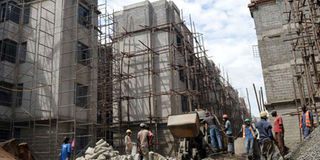Give affordable housing for youth priority

Construction of civil servants' houses in Kisumu County. Affordable housing is part of President Uhuru Kenyatta's Big Four development agenda. PHOTO | FILE | NATION MEDIA GROUP
What you need to know:
- A 2017 OECD report shows that construction in Africa only received 2.7 per cent of bilateral commitments from foreign aid.
- Last year, the National Treasury allocated Sh2.9 billion to the construction of police and civil servant homes
- Housing projects are long-term, capital-intensive projects that often outlast most executives in government.
- The government’s plan to deliver 500,000 affordable homes through private-public partnerships, is commendable.
Shelter is a very human and present matter for everyone. However, it is not as engaging or marketable as, say, the environment, food, education, transport, healthcare or gender equality.
A 2017 OECD report shows that construction in Africa only received 2.7 per cent of bilateral commitments from foreign aid. That rises to 3.3 per cent when looking at the European Union contribution, but shrinks to 1.4 per cent when looking at the World Bank contribution.
Social industries such as education, health, water and sanitation, however, received a whopping 45 per cent of total contributions. This underscores how housing is prioritised.
But here is a little context. Traditionally, industry and construction are not the typical recipients of aid financing, nor should they be.
A key priority for every nation is to build its economy and ensure citizens get a decent living. Housing falls under both categories.
Still, this does not explain why housing is not a priority for African governments.
CONSTRUCTION INDUSTRY
The numbers are global for the construction industry; they do not isolate housing. Viewed independently, housing construction has a 16.4 per cent share of the total value of construction in Africa, below that for oil and gas, transportation, and energy and power.
Last year, the National Treasury allocated Sh2.9 billion to the construction of police and civil servant homes whereas the standard gauge railway got all of Sh75.5 billion.
But housing projects are long-term, capital-intensive projects that often outlast most executives in government. The smart money is always on high-impact, high-visibility projects that can be turned around. Most governments tend to focus on the supply side as well; there is a tradition of leaving housing to the private sector to fix, the argument is that a growing population is incentive enough to a commercial developer. But that is not the case, as we are experiencing a glut in the high-end market in Nairobi while the low-cost market is desperately underserved.
The economics, too, have to make sense for all. Additionally, there are few indigenous developers who can carry out large-scale development.
STRATEGIC VISION
The World Bank puts Kenya’s housing deficit at two million units cumulatively. This is also true for most major African markets. But financing alone will not solve this for Africa, especially without a strategic vision. This is why prioritising large-scale affordable housing projects that will speak beyond statistics and have a real impact on people’s lives is key.
Housing is a social issue but a political problem and there has been a lack of political will. However, we must move the needle and see housing as a human problem.
A city, or town, is a living thing and it will require living solutions to its problems. Beyond land provision and construction, there are matters of urban planning, environmental management and public goods, which we need to address.
Policy on affordable housing must put the human being at the centre; it must be user experience-centred. Failure to do this results in informal settlements.
It must be just as it is intentional. Failed attempts will lead to a lack of interest and continued political will, which simply perpetuates the cycle.
AFFORDABLE HOMES
The government’s plan to deliver 500,000 affordable homes through private-public partnerships, is commendable. But it is a complex undertaking that will require all stakeholders to pull in the same direction.
We’ll have failed the future if we don’t prepare to house Africa’s greatest resource: Its youth. Africa is on the verge of reaping a demographic dividend but, to realise it fully, we must address housing, its role in the design of our cities and how to make them resilient and sustainable.
It is also good economics: There will be 1.2 billion urban dwellers in major African cities by 2050, who will need a home. Let’s invest in the future; the returns are well worth it.
Mr Adewole is managing director of Shelter Afrique, a pan-African housing institution.





